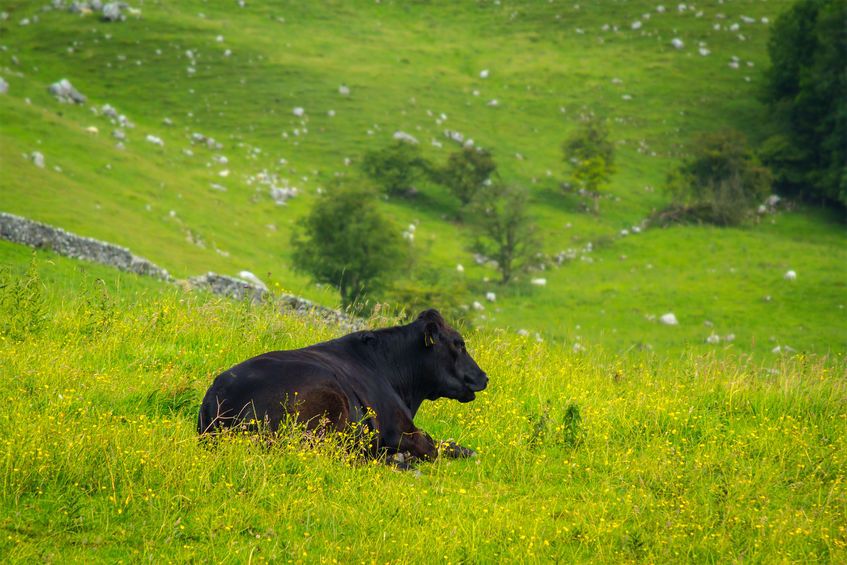
Economic water regulator Ofwat has been heavily criticised by farmers on social media for 'misrepresenting' UK beef production after a tweet encouraging people to go meat-free backfired.
Ofwat, the body responsible for economic regulation of the privatised water industry in England and Wales, used Twitter to encourage #MeatFreeMonday on 29 April.
Using a picture from Waterwise to demonstrate its point, Ofwat said: "Did you know it takes 15,415 litres of water to produce 1kg of beef, but only 322 litres of water per 1kg of vegetables?"
It’s @Waterwise’s #WaterSavingWeek and all this week we’ll be sharing water saving facts and tips. Today is #MeatFreeMonday! Did you know…the majority of water used worldwide is in the production and consumption of goods and services, especially food? #Factoftheday pic.twitter.com/Jn3r2QIfcI
— Ofwat (@Ofwat) April 29, 2019
After posting the tweet, dozens of farmers and groups criticised the regulator for misrepresenting UK beef production.
The NFU pointed out that 85% of the water ‘used’ in UK beef production comes from natural resources like rainwater thanks to Britain's temperate climate and abundant grassland.
Your tweet misrepresents beef production in the UK – 85% of the water ‘used’ comes from natural resources like rainwater. Shoppers can enjoy British beef knowing we have one of the best water footprints in the world.
— National Farmers' Union (@NFUtweets) April 30, 2019
Are @Ofwat supposed to be impartial? https://t.co/DWgaCS6l7v @NFUtweets @FarmersWeekly @FarmersGuardian @FUWpress @FarmingUK
— Gareth Wyn Jones (@1GarethWynJones) April 29, 2019
Can you provide the data to support this claim that BRITISH produced meat has such a poor water footprint?
— Andrew Clark (@lambswick) April 30, 2019
Fact of the day, did you know that British Beef uses 67ltrs of piped and irrigated water per kg...looking at your tweet obviously not https://t.co/5lSO5XgAQ2 pic.twitter.com/eWAbjmlhoa
— Adam Quinney (@ACQuinney) April 29, 2019
Others lambasted Ofwat for 'dangerously tarring' food production systems.
As any maths theacher will say, please show your working.
— Jack Watts (@JGCWatts) April 30, 2019
How do you differentiate between different systems in different geographies? Or are you dangerously tarring every production system in every country with the same assumptions?
So I currently have 170 ewes and 250 lambs in a 10acre field with a 500litre water bowser. They have 'almost' drunk it in a week. So 250 lambs at 250g/day growth =62.5kg growth/day. 7 days =437kg using ~500 litres of water= 874ml/kg + the ewe growth.
— Garton Hardy Farming (@IanDHorsley) April 29, 2019
Rain provides the grass...
Off course vegetables and plants don’t need any water to grow do they !!! Our grass fed beef is fed of grass and natural water in springs etc what’s wrong with that ?
— Andrew Robinson (@AW_ARobinson) April 29, 2019
And do you have figures relevant to the UK and grass fed livestock? And if we all did meat free Monday will the uneaten grass stop absorbing moisture? I thought we wanted grass to absorb moisture to stop run off and flooding, is that not why we are planting water hungry trees?
— John Fyall???? (@sittytonfarmer) April 30, 2019
NFU Cymru criticised the tweet, saying Waterwise’s portrayal of livestock farming as a sector that is wasteful of water is entirely 'unfair and without foundation'.
The union's president, John Davies said: “The Welsh farming sector is an efficient user of water. Water abstraction for agriculture is highly regulated and monitored.
“In fact, many farmers actually store winter water for use in the summer, rather than abstract from other sources in the warmer months and they would like to be enabled, through policy, to do more."
He added: “Waterwise’s decision to use statistics that do not accurately reflect Welsh grass-based productions systems and agriculture’s use of water also discredits the value that farmers add to the relatively small amount of water they do use."
It follows Welsh farmers calling out recent reports which suggest meat production in Wales require large quantities of water needed to produce.
The Farmers' Union of Wales (FUW) said such reports are 'well wide of the mark' in Wales, where it’s mainly 'green water', or rainfall, which irrigates the pastures.
“Here the majority of stock benefit from 'green water', the world wide definition of the rainfall that is used at the place where it falls,” said Charlotte Priddy, FUW Policy Officer.
She added: “Even Compassion in World Farming agrees that 'raising farm animals outside on grass that is watered by rainfall is a better way to manage our water supplies than industrial farming.'”
